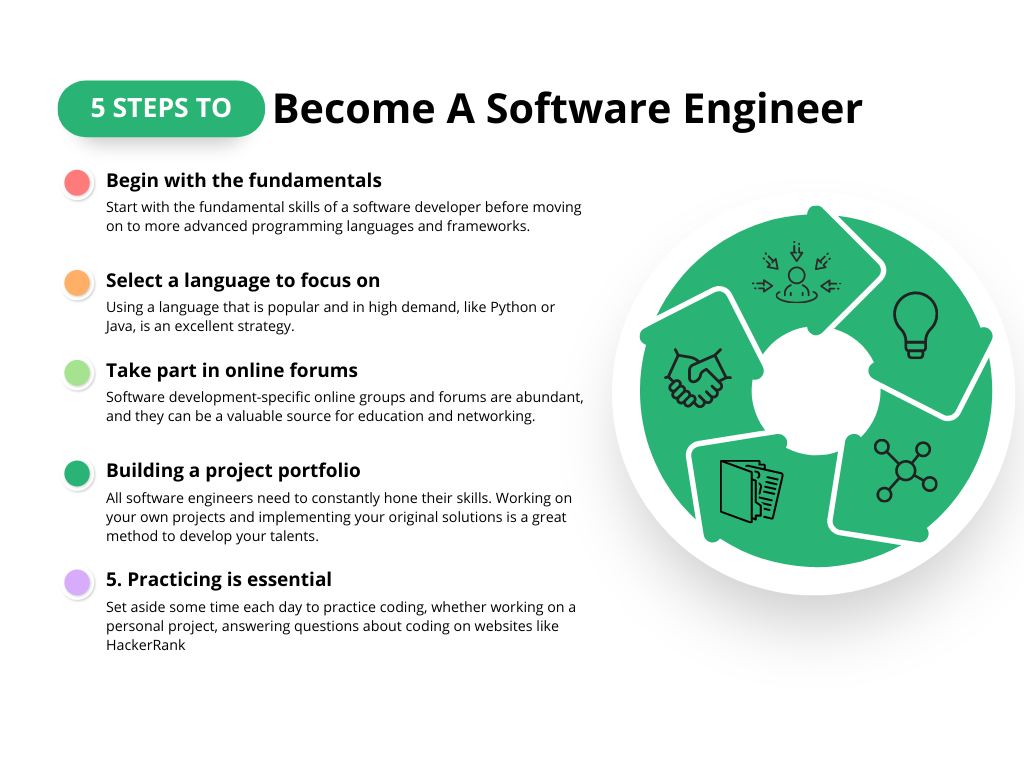
It can be an exciting and gratifying path to begin a career in software development, but it can also occasionally feel daunting. It’s simple to get lost in the sea of information when there are so many programming languages, tools, and frameworks available to be leveraged.
As a beginner in a career in technology, the most famous choice is to opt for a full stack developer course as it assures the right mentorship, which students essentially lack during their college years. Sure, it’s easy to get lost, but you just need the right mentor or institution that promises you growth.
According to the Bureau of Labor Statistics, the employment of software developers is predicted to grow by 21% between 2019 and 2029, which is far faster than the average for all occupations. When deciding on your area of concentration, choose an industry that is increasing swiftly, like healthcare technology or cybersecurity.
Here are ten straightforward suggestions for how to become a software engineer, along with some useful starting points.

1. Begin with the fundamentals
Start with the fundamental skills of a software developer before moving on to more advanced programming languages and frameworks. Learn the essentials of computer science, including variables, functions, and control structures in programming as well as algorithms and data structures. To get you started, check out these resources:
- Geekster Full Stack Development Course
- Computer Science Overview | Harvard University
- Basics of Programming | Khan Academy
2. Select a language to focus on.
Knowing where to begin might be intimidating because there are so many different programming languages available. Using a language that is popular and in high demand, like Python or Java, is an excellent strategy. Focus on mastering the language you’ve decided to specialize in before attempting other languages.
3. Take part in online forums
Software development-specific online groups and forums are abundant, and they can be a valuable source for education and networking. Join online communities and discussion boards to meet other developers, exchange ideas, and obtain code-related criticism. To get you started, check out these resources:
67.7% of developers utilize online forums like StackOverflow and Reddit for coding support, according to Stack Overflow’s 2021 Developer Survey.
4. Building a project portfolio
All software engineers need to constantly hone their skills. Working on your own projects and implementing your original solutions is a great method to develop your talents. You can begin modestly. Nobody anticipates you starting from scratch with a complex creation. Anything is possible, whether it’s playing a game or using a little mobile application.
Your potential employer will be impressed if you show up to a job interview with a prepared portfolio of your previous projects, both personal and professional. You get the chance to talk about your own initiatives and proactive work as well as work that you are enthusiastic and passionate about. Additionally, keep in mind that you will be asked about technological fundamentals and theory less frequently the more in-depth you discuss your own work in the interview.
Potential employers of software developer jobs can see your talents and experience through a portfolio of your work. Software development is the third-fastest-growing job, and portfolio development is one of the top talents required for the position, according to LinkedIn’s 2020 Emerging Jobs Report.
5. Practicing is essential.
As with any ability, programming needs practice to become proficient. Set aside some time each day to practice coding, whether working on a personal project, answering questions about coding on websites like HackerRank, or just going over and making improvements to previous projects’ code. To get you started, check out these resources:
6. Keep abreast of market trends
Because the software development industry is constantly changing, it is vital to stay up to date on the latest trends and technology. Follow industry blogs and news websites to stay informed and updated on the newest advances, attend conferences and events, and network with other engineers.
7. Participate in open-source initiatives
Open-source initiatives are a terrific opportunity to expand your network, get experience, and sharpen your abilities. Start contributing to open-source projects that fit your interests and abilities. In addition to gaining priceless experience, you’ll also be helping the larger developer community.
8. Bootcamps or online courses are options.
The requirement for certification grows along with the demand for IT jobs. Software developers need to demonstrate their expertise more than ever before by being certified, as this will set them apart from the competition during job interviews. You get priceless practical skills and experience by enrolling in a certification course.
Our recommendation is to use what you’ve learned right away because, like with anything else, abilities that aren’t actively used fade away unnoticeably. Because of this, certifications are not everything; they are merely a way to enter; from there, it all depends on you and what you have to offer. And always keep in mind that you and your skill set, not the credential itself, are what advance your career. Never compromise one thing for the other.
Geekster is an immersive learning environment that combines live online sessions with knowledgeable professors, individualized mentoring, and practical projects that let you use your new knowledge in practical settings. Their program prepares you for job interviews and securing your ideal position in technology by covering in-demand programming languages and frameworks including JavaScript, React, and Node.js
9. Look for mentors
In order to successfully navigate the beginning of your career as a developer, mentors can be of great assistance. Look for seasoned programmers who can provide direction and assistance, whether it be a work colleague, a past lecturer, or a person you meet through online networks.
10. Keep striving and determined
As with any journey, beginning a career in software development can have its ups and downs. Even when faced with obstacles or disappointments, maintain your motivation and perseverance. Always keep in mind that becoming a successful developer takes time and experience and that every error or setback is an opportunity to grow.
As a result, while beginning a career as a software developer may seem challenging, with the appropriate attitude and approach, it can be a successful and meaningful professional path. Follow these ten pointers to get going on your path to success as a developer, and always remember to stay driven, persistent, and open to learning new things.

